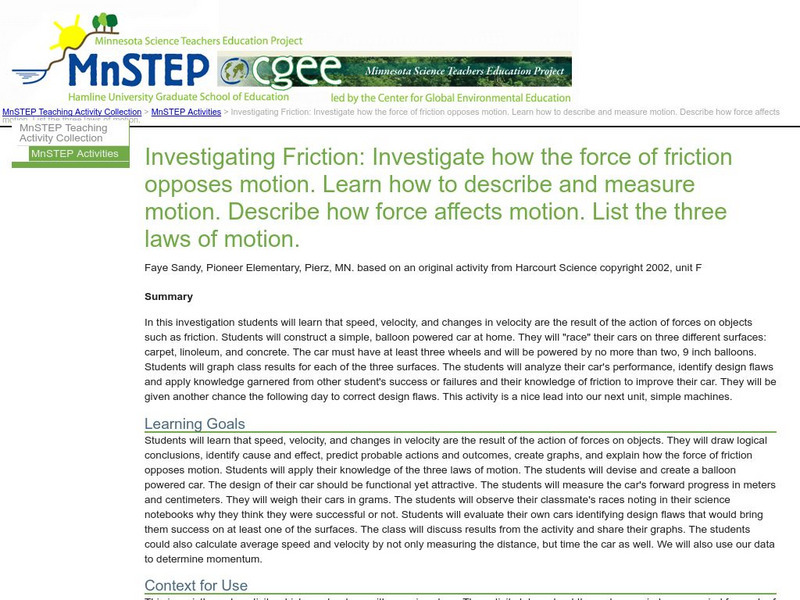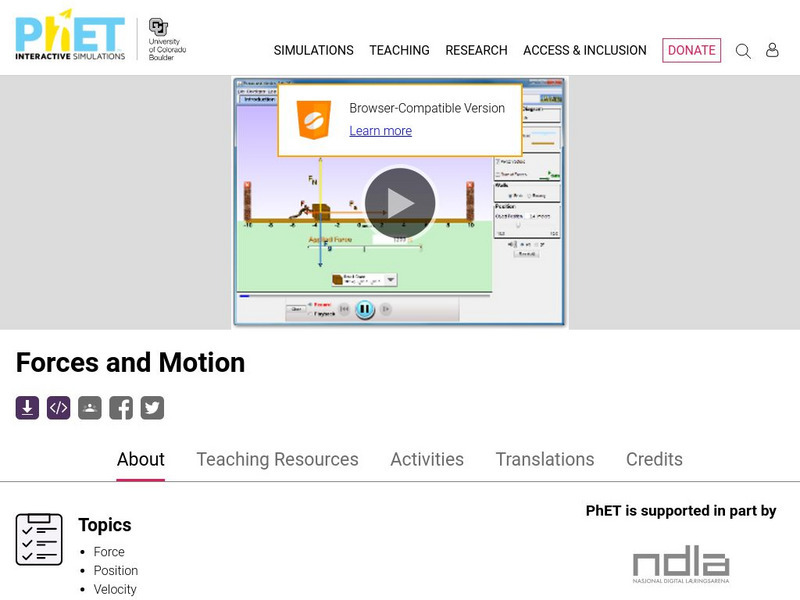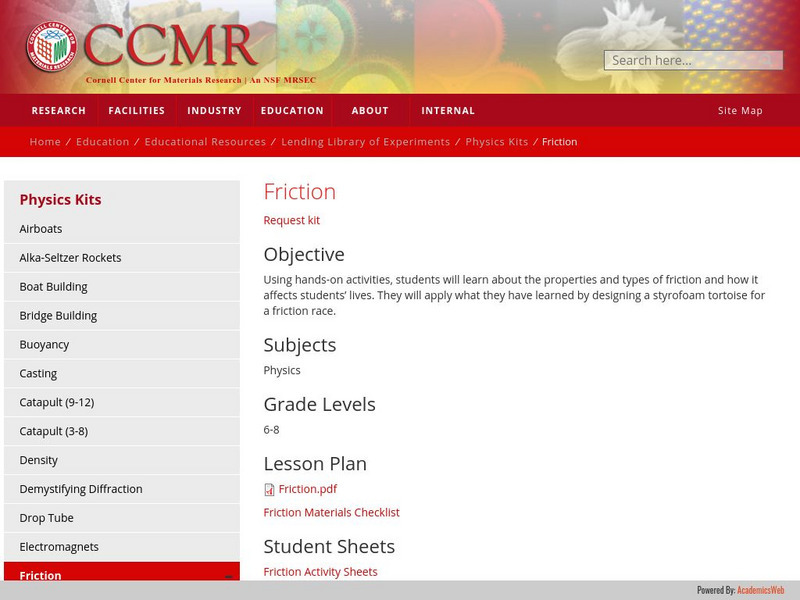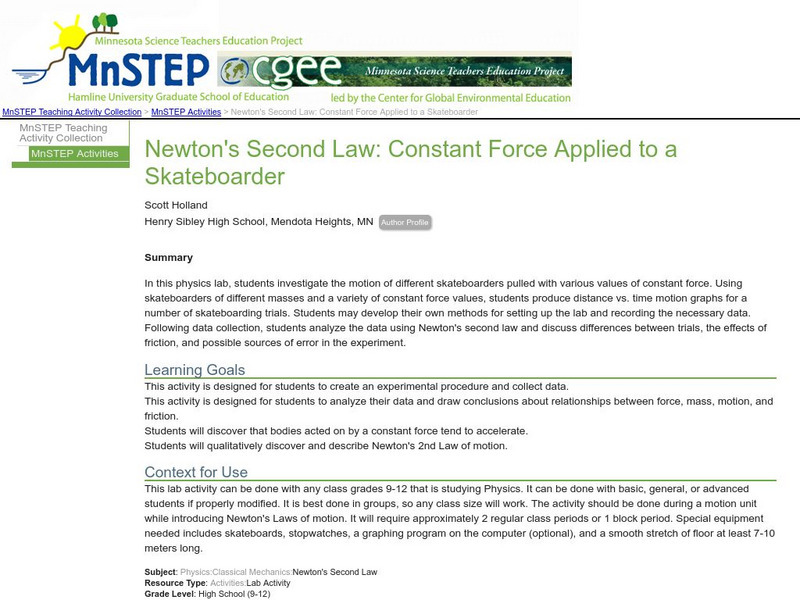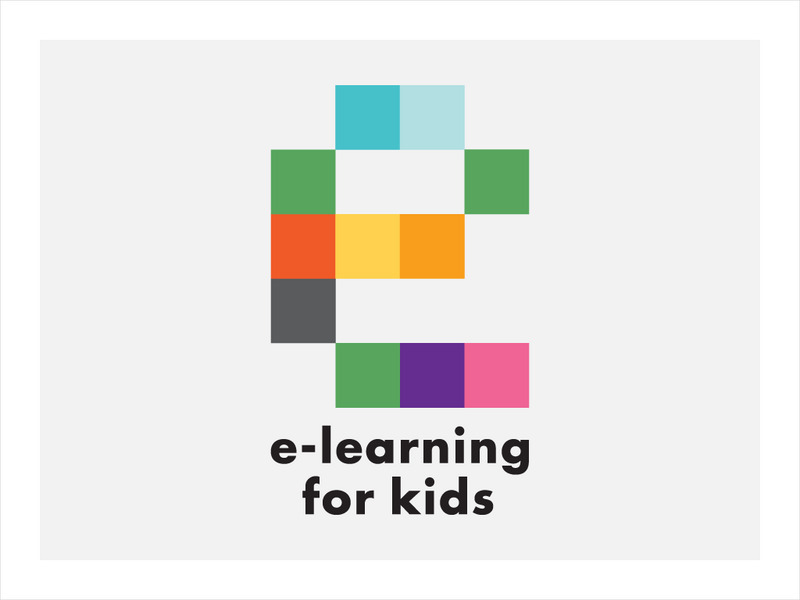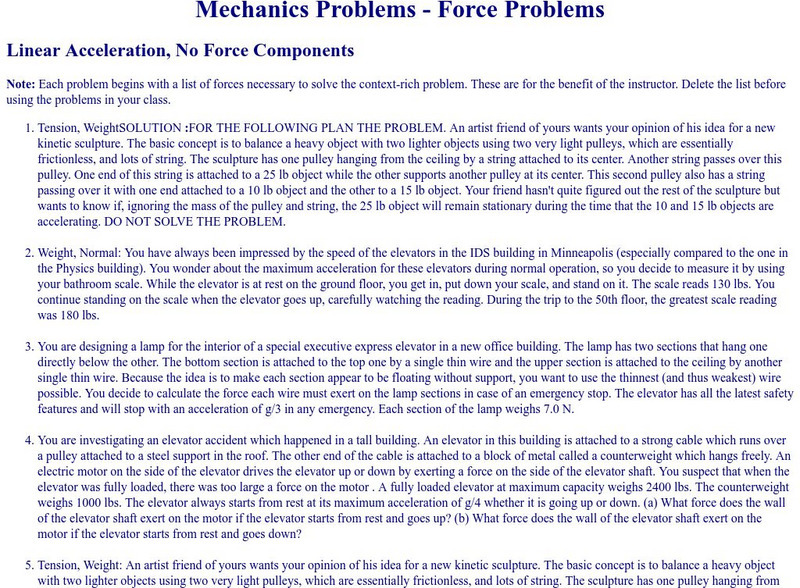Science Education Resource Center at Carleton College
Serc:investigating Friction:investigate How the Force of Friction Opposes Motion
In this investigation, young scholars will learn that speed, velocity, and changes in velocity are the result of the action of forces on objects such as friction. They will be able to explain how the force of friction opposes motion by...
TeachEngineering
Teach Engineering: The Force of Friction
In the first of two lessons of this curricular unit, students are introduced to the concept of friction as a force that impedes motion when two surfaces are in contact. Student teams use spring scales to drag objects, such as a ceramic...
Physics Classroom
The Physics Classroom: Circular and Satellite Motion: Roller Coaster Model
An interactive playground for students to explore the physics of roller coasters. Learners investigate by changing the variables of force, velocity, friction, and vectors. Energy bar charts are displayed as the coaster car moves along...
University of Colorado
University of Colorado: Ph Et Interactive Simulations: Forces and Motion: Basics
Explore the forces at work when pulling against a cart, and pushing a refrigerator, crate, or person. Create an applied force and see how it makes objects move. Change friction and see how it affects the motion of objects.
TeachEngineering
Teach Engineering: Energy of Motion
By taking a look at the energy of motion all around us, students learn about the types of energy and their characteristics. They first learn about the two simplest forms of mechanical energy: kinetic and potential energy, as illustrated...
University of Colorado
University of Colorado: Ph Et Interactive Simulations: Forces and Motion
Explore the forces at work when you try to push a filing cabinet. Create an applied force and see the resulting friction force and total force acting on the cabinet. Charts show the forces, position, velocity, and acceleration vs. time.
Cornell University
Cornell University: Cornell Center for Materials Research: Friction
A collection of experiments where students can learn about how friction works and affects the physical world. At the end, students design a tortoise to win by slowing it down using friction. Lesson includes explanation of the concept of...
Texas Instruments
Texas Instruments: Frictional Forces
In this activity, students' will use a Dual range force sensor to measure the force required to pull a block across different surfaces. They will examine the results to see when more force is needed to move the block and understand the...
BBC
Bbc Schools: Ks2 Bitesize: Science: Physical Processes: Friction
Use your knowledge about friction to help Carrie get to the Invigatron before someone steals it. Following the activity, read more about friction and resistance, and then take a quick quiz to check for understanding.
Georgia Department of Education
Ga Virtual Learning: Forces
Students learn about various forces and how they relate to everyday life in this interactive learning module.
Khan Academy
Khan Academy: Activity: Frictional Force Experiment
A lesson about friction can be found on this website. Students will experiment to see how motion and frictional force affect the game of football.
Sophia Learning
Sophia: Friction: Lesson 4
This lesson will introduce the concept of friction and explain how it can affect forces. It is 4 of 5 in the series titled "Friction."
Science Education Resource Center at Carleton College
Serc: Newton's Second Law: Constant Force Applied to a Skateboarder
In this lab activity, students will become familiar with Newton's 2nd Law of Motion. By investigating the motion of different skateboarders pulled with a variety of constant force values, they will discover that bodies acted on by a...
E-learning for Kids
E Learning for Kids: Science: Pirates: What Are Some Forces Around Us?
Covers the meanings of force, friction, and gravity, and the differences between magnetic and elastic spring force, and between weight and mass. The effect of air resistance on an object's motion is also touched upon.
Science Education Resource Center at Carleton College
Serc: Inertia: An Object in Motion Will Tend to Stay in Motion
This activity is a take off of Galileo's experiment with the inclined planes to show that an object in motion would stay in a straight line motion if no outside forces acted were acting on it. In this version, students will roll a ball...
Physics Classroom
The Physics Classroom: Finding Individual Forces
Explore the world of finding individual forces. "The process of determining the value of the individual forces acting upon an object involve [sic] an application of Newton's Second law and an application of the meaning of the net force."
University of Minnesota
University of Minnesota: Mechanics Problems: Force Problems
This University of Minnesota site provides a series of contextually rich, real-world problems demonstrating force and Newton's second law of motion.
Physics Aviary
Physics Aviary: Practice Problems: Motion on Incline Level 2
Students must calculate the distance an object will move up an incline using Newton's Laws. Mass, angle, gravitational field, coefficient of friction and initial speed will be generated randomly.
Physics Aviary
Physics Aviary: Practice Problems: Motion on Incline Level 3
Students must calculate the speed of a block when it returns to its original location on an incline using Newton's Laws. Mass, angle, gravitational field, coefficient of friction and initial speed will be generated randomly.
Science Education Resource Center at Carleton College
Serc: Newton's Second: Having a Ball With Motion
Students will create a gravity ball launcher to demonstrate their understanding of mass, force, momentum, and motion. The students will use critical thinking, measurement, and observation and analysis of data to make changes and improve...
Science Education Resource Center at Carleton College
Serc: Investigating Motion: What Causes Objects to Move?
Students will have an opportunity to determine what makes everyday objects move. Students will be given objects and asked to make predictions on how far each object will move after they blow on it. Then they will measure the distance and...
Science Education Resource Center at Carleton College
Serc: Investigating Projectile Motion: Creating a Catapult
This activity is for 9th grade physical science students. It begins with an inquiry-based activity using a projectile motion computer simulation. It culminates with students building a catapult; applying and connecting science knowledge...
Physics Aviary
Physics Aviary: Practice Problems: Car on a Turn Problem
Students must determine the force of friction on a car on a turn and the maximum speed the car could navigate a turn.
Other
Center for Education Partnerships: The Marble Roll
In this Science-athon, students try to make their marble roll the farthest across a flat surface, using their knowledge of forces, motion, and energy to guide them through their apparatus design. Teachers must enroll online.
